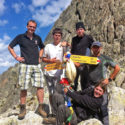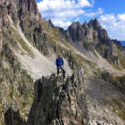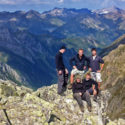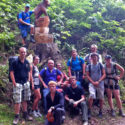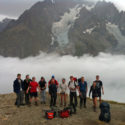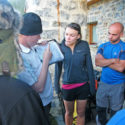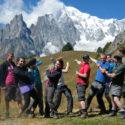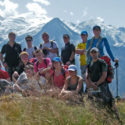Exercise Alpine Wanderer was a trekking expedition, through southern France, Italy and Switzerland, for one Officer, ten Officer Cadets, and two regular soldiers. The aim of the exercise was to increase the navigational skills, physical robustness and experiences of those deploying, in order to build self confidence and team work. All these aims were achieved
The outward journey was a 2 day trip from Dundee to Chamonix, where we had our initial campsite. This proved to be a suitable base to conduct acclimatisation walks prior to undertaking the main route around Mont Blanc proper. The trek to the Aiguillette des Houches with its outstanding views is highly recommended.
The tour was split into ten parts, with stage one to Les Contamines proving more cheeky than planned, due to a deviation, which caused us to lose a lot of height, which had to be regained later that day. This added a couple of hours, and the group got into its campsite early evening, very tired and extremely hungry.
Stage two was an excellent day in beautiful sunshine over the Col du Bonhomme at 2330 meters. The views were outstanding and worth the effort. We made this our lunch stop before beginning the knee crunching descent into the camp at Les Chapieux arriving just before 4pm.
Stage three saw us cross into Italy at the Col de la Seigne. If the views previously had been spectacular, they paled into insignificance as we crossed the border. Before us were the beautiful Val Veni and Val Ferret valleys. We were lucky to cross the pass in sunshine as not long after, the threatening clouds which hung over us, finally let go just before we arrived at the Refugio Elisabetta, where we stayed the night
Stage four took us to our rest day in Courmayeur, initially over the L’Arp Vieille and then Col Checrouit, catching glimpses of the glaciers Du Brouillard and De Freney through the cloud which permeated the area. Once over the summit, the route was again a trek down countless switchbacks, which tested the knees of the older individuals.
After our admin day, we set off crossing Col Sapin and the Pas Entre Deux Sauts at 2500 meters. This was a beautiful day, with high clouds providing an awesome backdrop to Monte Bianco. Morale was high and increased at the highly recommended Refugio Bonatti, with good accommodation, good food and good beer. What more can be asked for?
Stage six was the longest of our trip, walking 20km, over eight hours and 1100 meters of height. It was worth the effort as we crossed the Col de Ferrat into Switzerland. The landscape changed markedly, with beautiful alpine meadows and tiny hamlets, reminiscent of many a Bavarian walk. From the Col we descended steeply, until coming to the excellent camp site at La Fouly.
Stage 7 took us to Champex Lac, which was an easy traverse and took the group four hours. Unfortunately, the weather had turned cold with rain showers, which scuppered plans to go swimming. The change in the weather also altered the planned rest day and we cracked on towards Chamonix.
Stage 8 was the most spectacular of the entire trip, over the Fenetre D’Arpette. An awesome sight encountered us as we crested the summit at 2665 meters. We spent as much time here as the weather would allow, before making our way past fast eroding glaciers, until we came to our campsite at Col de Forclaz. That night we were subjected to an horrendous lightning and thunder storm.
There is not much to be said for Stages 9 and 10 except that we could see nothing but the low lying cloud which clung to the region bringing with it the first fall of snow. Imagine a walk up Ben Nevis in the clag, and you will have an understanding of the weather.
Rather than remain in Chamonix in the rain and snow, we moved north and conducted a mini-battlefield tour of the Somme and Ypres visiting Thiepval, the Newfoundland and Highland Division memorials as well as Tyne Cott. It was time to come home and after 36 hours in a mini bus we reached Dundee, where we handed over stores and equipment, and went our separate ways.
It would not have been possible to conduct this exercise without the fantastic support of the Ulysses Trust, Highland RFCA and CO of Tayforth UOTC.
For further information please contact Major Kev O’Neill (mercury1517@yahoo.co.uk)

